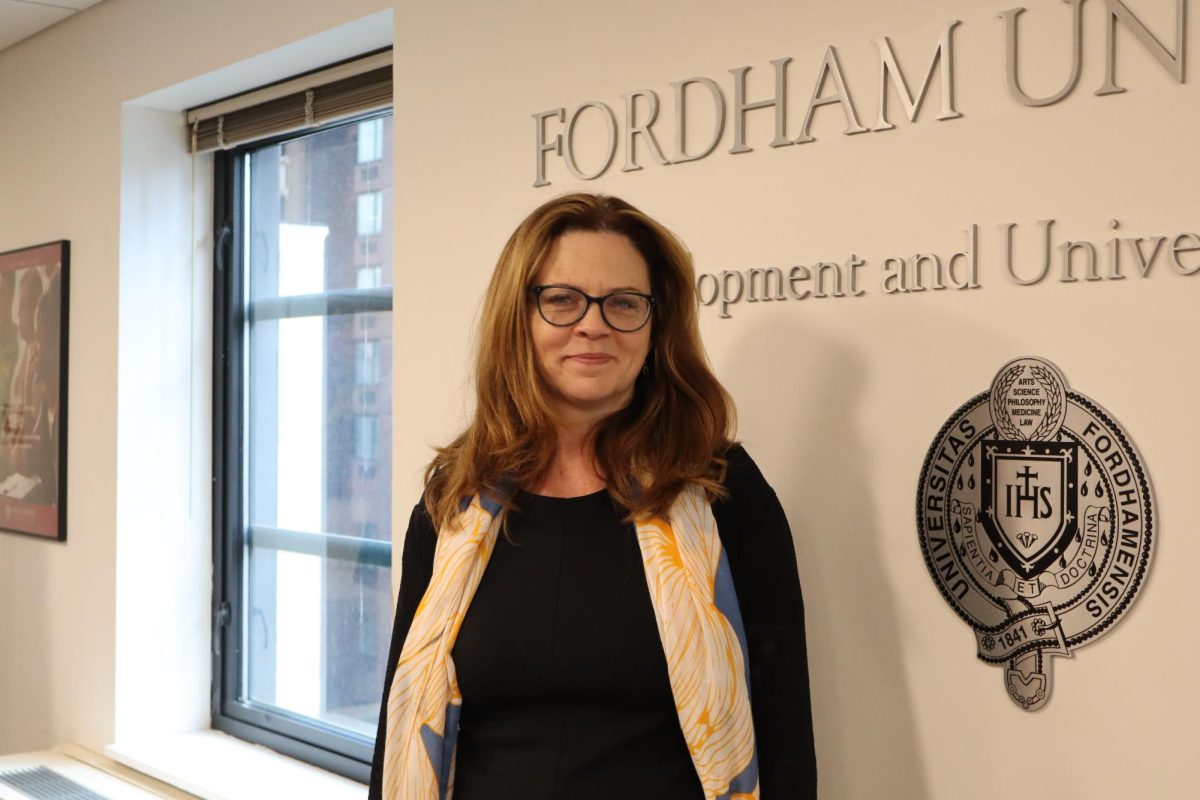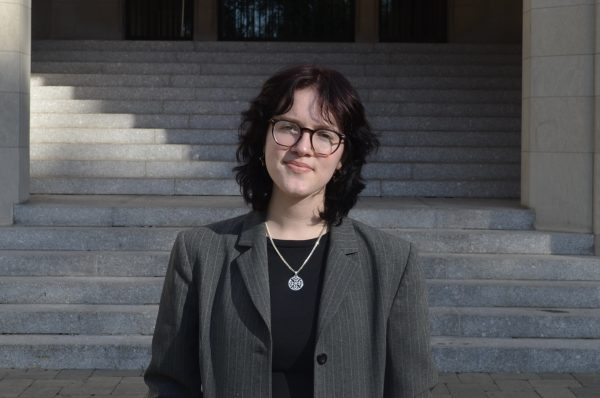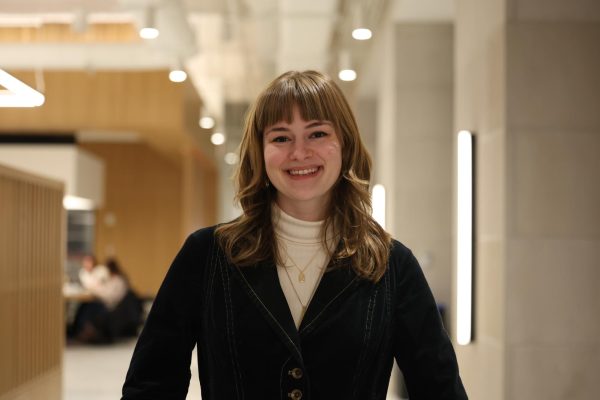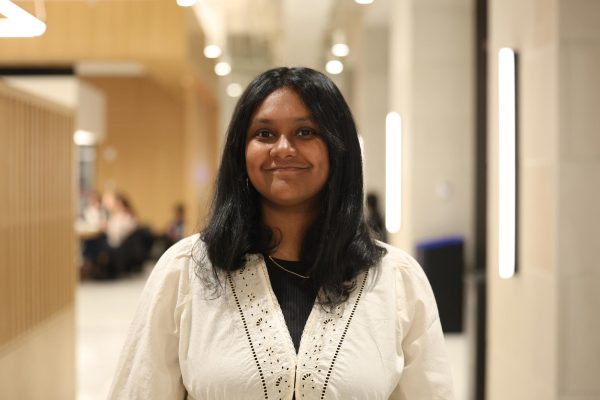President Tania Tetlow met with reporters from Fordham University’s student newspapers on April 8. The Fordham Ram and the Fordham Observer attended; the meeting to cover a variety of topics, including the recent visa revocations of two Fordham students, the new STEM building and changes to the University’s finances.
FORDHAM STUDENT VISAS REVOKED
On April 4, President Tania Tetlow shared via a university-wide email that an undergraduate student’s visa was revoked. During the press conference, Tetlow shared that a second international student had their visa revoked and added more about the circumstances behind these revocations and the university’s involvement.
The student whose visa revocation was announced on April 4 was not contacted by the Department of Homeland Security (DHS), Tetlow confirmed. The revocation was discovered during a daily routine check of the Student and Exchange Visitor Information System (SEVIS) by the Office for International Services, after which the university informed the student.
“You didn’t use to have to do that,” Tetlow said. “There was no need to psychically intuit [that] the government had changed its mind about a visa.”
Tetlow shared that the DHS has not provided the university with cause for the revocation yet. She also shared that the university is in contact with the student.
“We’re trying to provide as much support as we can because it is an unimaginable situation and we are so upset on his behalf,” she said.
Tetlow said that on the morning of April 8, a second student’s visa was found to be revoked. She said the university is limited in the information they can provide out of respect for both of the students’ privacy.
In her email on April 4, Tetlow announced a working group of faculty and administrators to address these concerns. During the press conference, Tetlow said they had started meeting the week prior and are now working on guidance for students, faculty and staff on work visas.
“Giving that guidance is difficult because there is so much uncertainty that is not within our power to unlock,” she added.
She said some of their work includes providing legal advice and helping ensure that students can complete school work online. The group also hopes to find opportunities for housing in the event that a student’s visa is revoked and they feel unsafe going to their home country.
Tetlow said she sent the email to the entire Fordham community because she felt it was important for Fordham students to know that national issues have reached Fordham and are affecting their fellow students.
“I want as many people as possible to know that this is happening and to spread the word through our community, through our board and all the stories you are seeing about this happening nationally,” she said. “It matters to know that this is hitting home.”
ACADEMIC FREEDOM AND FREE SPEECH
During the press conference, Tetlow was asked if she was worried about how the recent arrests of students and faculty who have engaged in political activism might affect free speech within university campuses. Fordham’s Vice President for Marketing and Communications Justin Bell clarified that arrests of this nature are not happening at Fordham.
“What I find ironic at this moment is that so many of the critics of academia who said we didn’t believe enough in free speech — and I thought many of those criticisms were fair — have now flip-flopped and are doing things to chill free speech. And that’s really a shame,” she said.
“Universities are supposed to be places where you can debate controversial topics and express views, some of which are unpopular, and that’s what we do, is we hash out hard issues,” Tetlow said. “I have been clear with faculty in individual faculty meetings, in the speech I gave, that Fordham defends academic freedom. But the pressures are not coming from us, they’re coming from the world.”
On Feb. 26, President Tetlow gave an address titled “Sign of the Times” to faculty and staff that addressed the university’s direction going forward.
When asked earlier about her address, Tetlow noted that Fordham’s Catholic grounding informs its process going forward.
“As a Catholic institution, we believe profoundly in fundamental human dignity and equality,” she said. “We believe in meeting people according to their needs … We believe in the idea that all are welcome here and that it is our job to make sure that students feel welcome here. Not just with vague platitudes but with very specific learning about how the stereotypes and hatreds and biases of the world are wrong.”
UNIVERSITY FINANCES AND THE TUITION INCREASE
Tetlow also spoke about the recently announced tuition increase for the upcoming school year and explained the necessity of the increase in light of routine employee pay increases and inflation.
“The cost of educating students has gone up for all the reasons you might imagine. Everything from normal pay increases for employees — which is two-thirds of our budget is people, faculty, staff, and administrators — and utilities and insurance and the impact of inflation,” Tetlow said.
According to Tetlow, the university’s highest funding priority continues to be financial aid.
“Our highest priority in the budget is financial aid,” she said. “It’s hundreds of millions a year. We continue to raise money from alumni for financial aid. So about half of our endowment is dedicated to scholarship funds, and that was a big part of the last fundraising campaign. We will continue to make that the highest priority.”
She encouraged students struggling to cover the cost of their education to contact the Financial Aid department and file an appeal.
Tetlow further explained that the university is working hard to cut costs without sacrificing quality.
“Our first priority is to contain those costs as much as we can,” Tetlow said. “In general, bridging the gap between the excellence that students deserve and the price they can afford to pay is brutally hard.”
These cost-cutting measures include a hiring pause and a 10% cut to non-staff expenses in all departments. Members of the university community were initially informed of these changes via an email sent by Senior Vice President and Chief Financial Officer Tokumbo Shobowale on March 14.
According to Tetlow, the hiring pause will primarily impact staff and administrative hiring and generally does not apply to faculty positions.
“The hiring freeze does not apply to tenure faculty searches and the hiring of adjuncts and lecturers is really about the size of the incoming class and how many courses we need to schedule,” Tetlow said. “The focus of the hiring freeze is on the staff and administrative side, not faculty.”
Tetlow acknowledged the difficulties that budget cuts create for all members of the community and emphasized the importance of responsible spending for the university.
“I am very aware that it is exhausting to have to constantly try to pinch pennies and be frugal in this way,” said Tetlow. “But I also believe that given that almost every dime that we spend comes from student tuition, it is part of our mission and values to be incredibly careful with every dime that we spend.”
The president also spoke briefly about the recent decrease in student worker hours, which have been impacted by budget cuts from the federal government.
“I do know that federal work study, which is some of the jobs that students work, was reduced this year by the federal government, and we are fighting hard in Congress to maintain it going forward,” Tetlow said. “If there are proposals specifically to cut work study, we will let students, parents, alumni, know that that is being considered, so you can tell Congress how you feel.”
During the fall 2024 semester, Tetlow announced via email that the university would be forming an Advisory Committee on Socially Responsible Investing to make recommendations to the Investment Committee of the Board of Trustees about future investments and divestments. According to Tetlow, the committee includes representatives from various forms of student government, the Faculty Senate, the Administrators’ Council and other groups.
“As you can imagine, getting each of those groups to meet and pick a representative and get that going takes a minute,” Tetlow said. She mentioned that she was currently unsure if the group had yet met with the Board of Trustees.
NEW STEM FACILITIES
In the press conference, Tetlow discussed the recent $100 million donation by Maurice Cunniffe, FCRH ’54, and Carolyn Dursi Cunniffe, Ph.D., GSAS ’71, which will be used to break ground on a new STEM building.
“We have needed a new STEM building for a very long time,” said Tetlow. “When we think about the best investment in the quality of your education and Fordham’s future, it is to invest in STEM at this moment when this has become evermore relevant.”
The building is set to be built on the surface parking lot at the Rose Hill campus. In addition to the donation, the university will need to raise more money to fully fund the construction of the building.
Tetlow also highlighted the Cunniffes’ previous donations and the reasoning behind this one.
“The Cunniffes have given huge amounts of money towards scholarships. We have the Cunniffe scholarship program,” she said. “They knew that we needed this bricks and mortar investment to really preserve and gain in our academic quality — so this money is for that building.”
Tetlow also discussed her hopes for the future of Fordham.
“I love the idea of that beautiful STEM building on Southern Boulevard,” she said. “Of doubling down on our Jesuit identity, of having a reputation for being the place to choose for college if you want to matter to the world.”











































































































































































































